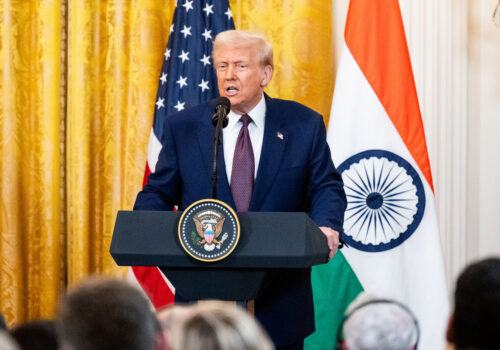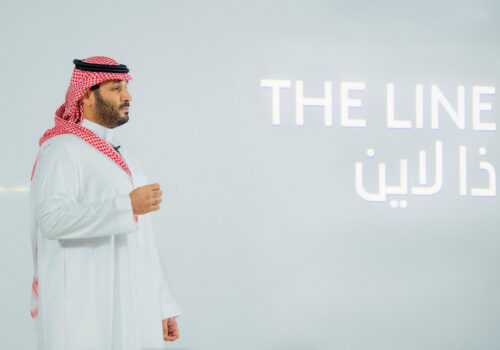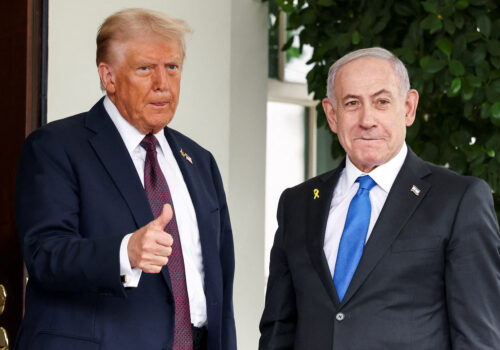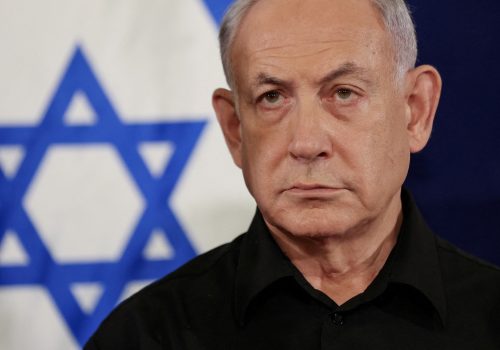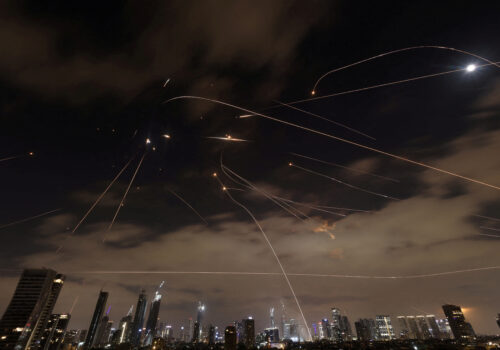The Trump-MBS meeting should center on Iran nuclear strategy
Many key discussion points for Saudi Crown Prince Mohammed bin Salman—often referred to as MBS—and US President Donald Trump are emerging ahead of the crown prince’s landmark arrival in Washington. Those include questions over whether Riyadh will normalize relations with Israel, the Trump administration’s military aid to Saudi Arabia, the issue of the Saudi nuclear program, and more. However, the need to reach a nuclear deal with Iran should be the focus of the leaders’ meeting.
The Trump administration has emphasized that it feels no pressure to reach a nuclear agreement with Iran as long as Tehran does not submit to all of its demands, primarily the cessation of enrichment in Iran and restrictions on its missile program.
However, MBS has significant incentive to raise the need to renew Iran nuclear deal negotiations in his meeting with Trump, given the negative consequences for the Middle East region—particularly Saudi Arabia—if hostilities between Israel and Iran resume. The best way to prevent a future regional conflict is to achieve a nuclear agreement between Iran and the United States that ensures Tehran cannot produce nuclear weapons—and, importantly, prevents war in the Gulf region.
Related reading
To understand why a nuclear deal with Iran should, certainly in Saudi eyes, be an essential part of meetings with the Trump administration, one must go back to the end of this year’s June war between Iran and Israel. The Twelve Day War ended without any nuclear agreement between Washington and Tehran, and in its aftermath, Iran has already embarked on rebuilding its military capabilities. Moreover, it is safe to say that the war also damaged hopes of a nuclear deal, deepening the mistrust between the Iranian regime and the US administration.
Israel and the United States did achieve significant operational achievements in the war—including significantly damaging the Iranian nuclear sites in Natanz, Fordow, and Isfahan and killing the Iranian nuclear scientists. On top of that, Israel significantly damaged Tehran’s air defense system and destroyed hundreds of its surface-to-surface missiles. But Iran’s moves in the weeks and months since the end of the Israeli and US military campaign, primarily the restoration of nuclear sites and the construction of Tehran’s conventional capabilities, indicate that Tehran has not surrendered. It continues to strengthen militarily, apparently in preparation for the next confrontation with Israel, according to regional media reports.
This fact should worry the Gulf states, including Saudi Arabia. Even if the Gulf’s leadership believes that increasing diplomatic relations with Tehran—which have strengthened in recent years—will protect Saudi Arabia in any future war between Israel and Iran, it might be surprised—and not pleasantly.
The likelihood of another conflict between Israel and Iran, as mentioned, seems very real—and experts assume the next conflict may be more intense and could include the Gulf states. This is backed up by the fact that Iran is threatening to use its navy and other weapons at its disposal in the next war, as well as by public discussions in Iran about a possible blockade of the Strait of Hormuz. Moreover, to the extent that Iran assumes that the United States will be involved in the fighting, it will probably seek to attack US bases throughout the Middle East, including those in the Gulf region.
In general, the more the Iranian regime feels that it is fighting for its life, the greater the likelihood that it will take desperate steps to stop the war, including bringing the Gulf states into the firing line, so that it can pressure Washington and Israel to stop the war. And since Israel is already aiming to overthrow the Iranian regime in the next campaign, the likelihood of those desperate moves could increase.
The fact that Trump likes MBS gives the Saudi crown prince good leverage if he chooses to raise the following points:
- MBS could point out that the status quo is unstable and does not serve US interests, including the risk to the global economy if another Israel-Iran war breaks out.
- The crown prince could also make the case that negotiations should be resumed as soon as possible—and the Saudis could even serve as mediators (although it is likely that the Omanis will be the ones to host the meetings).
- Perhaps most importantly, MBS could accept, on behalf of the Saudis, the idea of a regional nuclear consortium, in a way that will also advance Riyadh’s nuclear ambitions, including the establishment of a regional nuclear fuel bank.
- It is possible that MBS could argue to Trump that he is ready for a symbolic enrichment in Iran (which would advance an agreement with Tehran)—on the condition that Saudi Arabia also receives the ability to enrich on its soil.
In addition, it is true that MBS, who knows the Iranians well, will need to clarify to Trump what is possible and what is impossible to achieve in negotiations with Iran. At the moment, it seems that the Trump administration’s demands on Iran are perceived in Tehran as surrender, and not as a compromise.
The bottom line is that ignoring the Iranian issue in the dialogue between Trump and the Saudi crown prince could harm Saudi interests, given the increasing likelihood of renewed war in the Gulf. MBS needs to invest in trying to bridge the gaps between Iran and the United States; otherwise, he could bear the cost of a future war.
Danny Citrinowicz is a nonresident fellow with the Atlantic Council’s Middle East Programs. He is also a fellow at the Institute for National Security Studies.
Further reading
Mon, Oct 6, 2025
To preserve ‘Rising Lion’s’ achievements, Israel must support an Iran nuclear deal
MENASource By Danny Citrinowicz
Despite Israel's desire to solve its problems "by force of the sword", an agreement, not a renewed war, serves Israel's interests better.
Mon, Apr 28, 2025
Why Israel will resist any US-Iran nuclear deal
MENASource By Danny Citrinowicz
Negotiations between the United States and Iran have displayed a significant divide between Washington and it’s ally Israel.
Mon, Jun 16, 2025
Twenty questions (and expert answers) on the Israel-Iran war
MENASource By
The escalation between Israel and Iran has raised many important questions about a region already facing crises on multiple fronts.
Image: September 16, 2025, Doha, Qatar: Saudi Arabia's Crown Prince MOHAMMED BIN SALMAN (R) meeting with Iran's President MASOUD PEZESHKIAN (L) on the sidelines of the 2025 Arab-Islamic emergency summit in Doha. Arab and Muslim leaders convened for emergency talks in Doha on September 15 to discuss the recent deadly strike on Hamas members in the Qatari capital. During this summit, they called for a review of ties with Israel and will be discussing a draft resolution in solidarity with Qatar regarding the Israeli attack. (Credit Image: © Iranian Presidency via ZUMA Press Wire)
